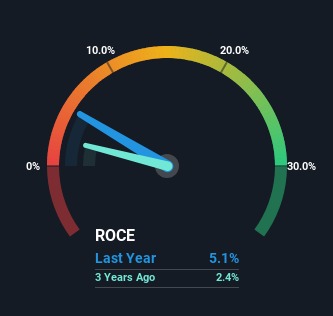
If we want to find a stock that could multiply over the long term, what are the underlying trends we should look for? Amongst other things, we'll want to see two things; firstly, a growing return on capital employed (ROCE) and secondly, an expansion in the company's amount of capital employed. Put simply, these types of businesses are compounding machines, meaning they are continually reinvesting their earnings at ever-higher rates of return. In light of that, when we looked at Grupa Kapitalowa IMMOBILE (WSE:GKI) and its ROCE trend, we weren't exactly thrilled.
What Is Return On Capital Employed (ROCE)?
Just to clarify if you're unsure, ROCE is a metric for evaluating how much pre-tax income (in percentage terms) a company earns on the capital invested in its business. Analysts use this formula to calculate it for Grupa Kapitalowa IMMOBILE:
Return on Capital Employed = Earnings Before Interest and Tax (EBIT) ÷ (Total Assets - Current Liabilities)
0.051 = zł28m ÷ (zł944m - zł404m) (Based on the trailing twelve months to March 2024).
So, Grupa Kapitalowa IMMOBILE has an ROCE of 5.1%. On its own, that's a low figure but it's around the 5.5% average generated by the Industrials industry.
Check out our latest analysis for Grupa Kapitalowa IMMOBILE

Above you can see how the current ROCE for Grupa Kapitalowa IMMOBILE compares to its prior returns on capital, but there's only so much you can tell from the past. If you'd like, you can check out the forecasts from the analysts covering Grupa Kapitalowa IMMOBILE for free.
The Trend Of ROCE
There are better returns on capital out there than what we're seeing at Grupa Kapitalowa IMMOBILE. Over the past five years, ROCE has remained relatively flat at around 5.1% and the business has deployed 52% more capital into its operations. Given the company has increased the amount of capital employed, it appears the investments that have been made simply don't provide a high return on capital.
Another point to note, we noticed the company has increased current liabilities over the last five years. This is intriguing because if current liabilities hadn't increased to 43% of total assets, this reported ROCE would probably be less than5.1% because total capital employed would be higher.The 5.1% ROCE could be even lower if current liabilities weren't 43% of total assets, because the the formula would show a larger base of total capital employed. Additionally, this high level of current liabilities isn't ideal because it means the company's suppliers (or short-term creditors) are effectively funding a large portion of the business.
Our Take On Grupa Kapitalowa IMMOBILE's ROCE
Long story short, while Grupa Kapitalowa IMMOBILE has been reinvesting its capital, the returns that it's generating haven't increased. Since the stock has declined 24% over the last five years, investors may not be too optimistic on this trend improving either. Therefore based on the analysis done in this article, we don't think Grupa Kapitalowa IMMOBILE has the makings of a multi-bagger.
If you'd like to know more about Grupa Kapitalowa IMMOBILE, we've spotted 2 warning signs, and 1 of them is significant.
While Grupa Kapitalowa IMMOBILE may not currently earn the highest returns, we've compiled a list of companies that currently earn more than 25% return on equity. Check out this free list here.
New: Manage All Your Stock Portfolios in One Place
We've created the ultimate portfolio companion for stock investors, and it's free.
• Connect an unlimited number of Portfolios and see your total in one currency
• Be alerted to new Warning Signs or Risks via email or mobile
• Track the Fair Value of your stocks
Have feedback on this article? Concerned about the content? Get in touch with us directly. Alternatively, email editorial-team (at) simplywallst.com.
This article by Simply Wall St is general in nature. We provide commentary based on historical data and analyst forecasts only using an unbiased methodology and our articles are not intended to be financial advice. It does not constitute a recommendation to buy or sell any stock, and does not take account of your objectives, or your financial situation. We aim to bring you long-term focused analysis driven by fundamental data. Note that our analysis may not factor in the latest price-sensitive company announcements or qualitative material. Simply Wall St has no position in any stocks mentioned.
Have feedback on this article? Concerned about the content? Get in touch with us directly. Alternatively, email editorial-team@simplywallst.com
About WSE:GKI
Grupa Kapitalowa IMMOBILE
Operates in the industry, construction and development, hotel industry, clothing industry, and automation and power engineering in Poland and internationally.
Solid track record low.
Market Insights
Community Narratives



